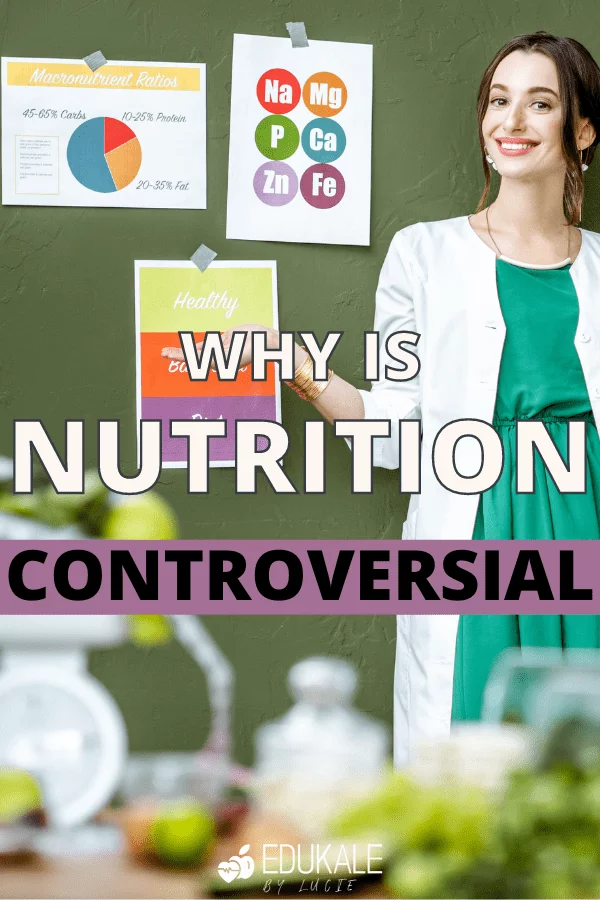This post contains affiliate links from which I may receive a small commission, at no extra cost to you. In no way does this affect my opinion or the information I provide on the product. Please read my disclaimer for more info.
Written by Lucie Villeneuve, nutritionist, M.Sc.
There’s so much conflicting information about nutrition.
You’ll hear that you need to be eating plenty of fruit and veggies, and then read about how they’re filled with pesticides and antinutrients.
You’ll learn that meat causes cancer— but the next day you’ll hear about an all-meat diet for weight loss.
You’ll have people telling you that you need to be drinking green juices every day, and others telling you it’s useless.
You’ll read that you need to avoid gluten, dairy, meat, non-organic foods, processed foods, and even unfiltered water— so you’re left wondering what you’re allowed to eat at all.

Isn’t nutrition a science? Why is it that nutrition information is so controversial?
Knowledge is accessible everywhere.
The first thing to point out is that we live in a world of easily accessible information. This is great, of course, because we can learn so much for free. If we hear about anything that interests us, we can instantly have access to as much information as we want about it.
But the downside of that is that anybody can put up anything on the internet, and you could be reading “facts” that are completely made up.
So if you want to learn about nutrition, you need to make sure that your sources are trustworthy, because there are so many self-proclaimed experts who actually give questionable information.

There’s also this world of influencers who sell food products and give nutrition advice without having any knowledge on it. This contributes to spreading false nutrition claims super fast. This is why you have to make sure that you’re getting your information from the right sources, and from people who use scientific evidence.
But even within the scientific community, things aren’t as simple.
Science is not simple.
Quality studies are difficult to put in place
In most areas of medicine, there’s a type of study that’s considered to be the gold standard for evidence: the randomized controlled trial [1]. It involves randomly assigning subjects to two groups, one of them receiving a treatment, and the other a placebo.
(A placebo is a substance or procedure that has no therapeutic effect, used as a control.) The only difference between the two groups is the treatment: if the outcomes are different, we know it’s because of the treatment.
Now when it comes to nutrition, this is extremely difficult to put in place. Ideally, we would need to make a random group of people eat nothing but “unhealthy food” for their entire lives, while the other group would eat only “healthy food”.

In order for the people to actually follow the diets, they would need to be monitored rigorously to make sure they didn’t cheat. Throughout their lives, we would then analyze different biological markers, note the presence or absence of diseases, and establish links between these outcomes and their diets.
It’s easy to see why this wouldn’t work out— forcing people to stick to a specific diet every single day for the rest of their lives is pretty difficult. Furthermore, even if we were able to do it logistically, it would be pretty unethical, because we already know that whole, fresh foods are healthier than processed junk foods.
We know this thanks to observational studies, which track people who are already eating a certain way.
However, these are far from ideal.
It’s hard to rely on observational studies
First of all, most observational studies rely on food surveys that participants fill out on their own. This is obviously imprecise— most people struggle to remember what they ate for their last meal, so remembering every single food item they had over an extended period of time seems difficult.
Some people also lie about what they actually eat for fear of being judged.

Secondly, observational studies aren’t randomized, so certain groups of people may have common characteristics that aren’t directly linked to what they consume. For instance, maybe vegetarian groups smoke less, exercise more, and are higher-income, and maybe that is the reason why they appear to be healthier instead of because they don’t eat meat.
Even if researchers try to account for these factors, they may influence the outcome of the studies, and therefore the resulting nutrition recommendations.
Conflicts of interest are frequent
Another major problem with nutrition research is that a lot of it is funded by food industries which are obviously concerned by the study’s outcome. In general, industry-funded studies have results that are more favorable to the industry.
This study [2] shows that, of articles with food industry involvement, 56% reported findings favorable to the food industry’s interests, compared to 10% of articles without food industry involvement. The competing interests of the food industry could be a major reason why certain nutritional guidelines appear to completely contradict each other.
This is the case for dairy, for instance— a lot of the studies promoting dairy’s benefits are funded by the dairy industry.
Food (and people!) are complex.
A food is made up of different components: nutrients, vitamins, minerals, water, fiber, polyphenols…the list goes on. They all interact with each other physically and chemically, giving specific properties to the food.
These interactions determine the food’s health benefits and physiological effects.
This complex and unique structure is the food matrix [3]. (More information in my blog post HERE!)
If you isolate each individual compound of the food, they will behave differently than inside the whole food. Basically, a food is more than the sum of its nutrients— yet certain studies look at the impact of specific isolated nutrients and draw conclusions from that. This may cause confusion regarding the health factor of these nutrients. For instance, the fructose in fruit is healthy while the one in soda is not, so it’s difficult to draw conclusions concerning fructose specifically.
Even if we look at two seemingly similar food items, like a homemade pizza and a fast-food pizza, the nutritional properties can vary greatly, furthering the confusion.
Another thing to take into account is the complexity of humans. People can eat very similar meals and have entirely different responses. (Side note— this is why it’s very important to work with someone who understands your specific needs instead of following ready-made meal plans!)
A study [4] following 800 people who ate the same foods showed that each individual had different glucose responses for instance. So many factors influence the way we process food, and what works for one person won’t necessarily work for another.

This is why certain people will rave about their keto diet while others will say that a vegan diet saved them, even if these diets are completely different. There can also be a belief system around food, like being a part of a community by following a specific diet, having heard certain things about nutrition since birth, perpetuating family habits and traditions, etc. These things can all impact our views on nutrition and fuel the controversy.
So what should you do?
You should always keep an open and critical mind when it comes to the nutrition information you consume. Make sure that the sources you get your information from are reliable and science-based. Be especially critical when people are trying to sell you something, especially when it seems too good to be true.
In general, balance and moderation are key. “Always” and “never” are rarely accurate when it comes to nutrition.
Healthy eating means eating a variety of whole, healthy foods and having delicious yet balanced meals. Some foods are healthier than others and should make up most of your meals (fruit and veggies, whole grains, healthy protein, nuts and seeds…), but there’s room for ANY food you like and nothing has to be off-limits.
Any restrictive dieting should be avoided, and you must be in it for the long haul. This is why I recommend intuitive eating, which is very sustainable.
Beyond healthy eating, it’s crucial to maintain a healthy relationship with food, to get into the correct mindset for healthy eating, to be physically active, and to take care of your mental health. Don’t hesitate to read my article on healthy eating for beginners to get you started, or to get my Food Facts & Freedom e-book.
If you feel like you need help that is specifically tailored to your needs, I also offer one-on-one online coaching so we can reach your goals together! You can read more about that here.

in short…
There’s a lot of controversial information about nutrition. This is because information is accessible everywhere but is not always reliable. In addition, quality scientific studies are difficult to put in place and conflicts of interest are frequent, leading to contradicting information.
People also have their own physical reactions or beliefs when it comes to food. Make sure to stay critical and open-minded, and focus on learning how to nourish your body properly all while bettering your relationship with food: I have plenty of resources on this site to help you do just that!
-Lucie
If you’re interested in nutrition, its impact on our health, and the science behind it, you should definitely read How Not to Die. In this book, Doctor Michael Greger, founder of Nutrition Facts, examines the top causes of death in America and explains how your diet can prevent— and in some cases even reverse— them. His advice is all backed by science and he writes in a very clear and entertaining way. This book isn’t a list of what you already know. It will teach you the keys to living a long healthy life, in a simple and practical way, and without spending fortunes on supplements and pills!
PLUS if you want to take it a step further, you can check out the How Not to Die Cookbook to implement the advice easily!


